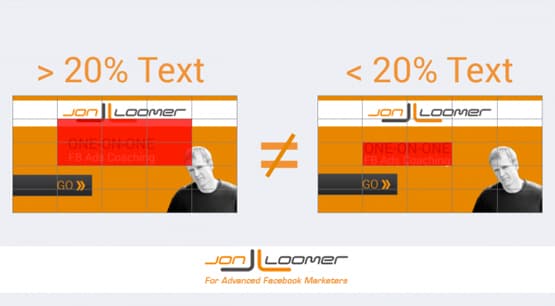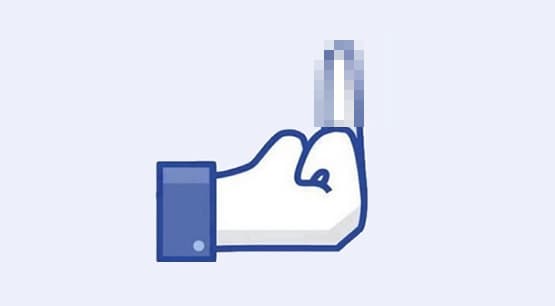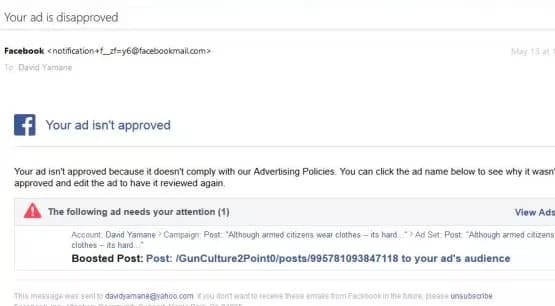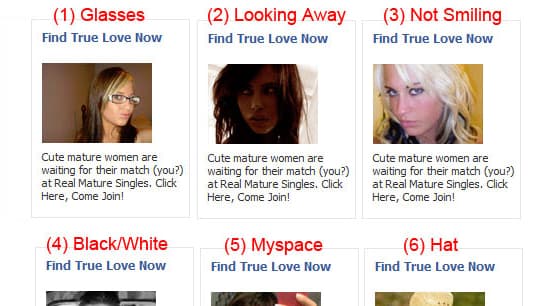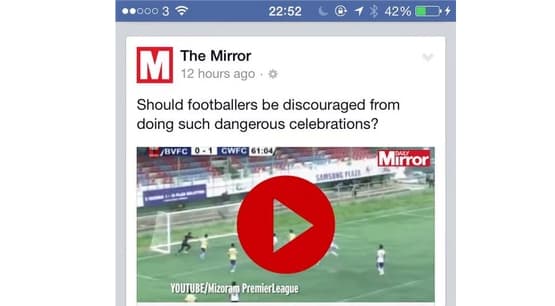25 Reasons Facebook Will Deny Your Ad Graphic
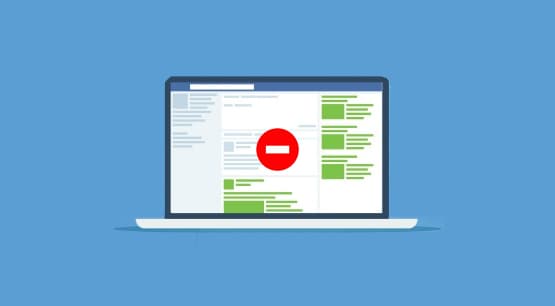
Facebook has a lot of rules regarding the ads they allow on their platform. Depending on your situation, you may have encountered some of them before. You may also have encountered how inconsistent they can be sometimes.
The fact is, Facebook has billions of users and millions of people using the ads system. There’s no way they could hire enough people to go through and scan every single ad that passes through their reviews.
Instead, Facebook has some fairly sophisticated image recognition algorithms in place. Some of them detect signs of nudity, some detect an overly high density of text, and so on. If an image trips one of those algorithms, it is flagged for manual review. This means the image will be looked over by an actual human and a determination will be made.
The question is, what specifically can lead to an ad rejection? If we discount issues with copy, issues with landing pages, and issues with targeting, we’re left with issues with the images. Here are some potential causes.
Before we begin, however, let’s make two major points you’ll need to know.
- Just because you find it acceptable doesn’t mean it is. A lot of subtle racism, sexism, and other inflammatory content might not be obvious and might be widely accepted in your community, but it still violates rules.
- Just because someone else is doing it doesn’t mean you can. Sometimes a bad ad slips through the cracks. If it’s reported, Facebook will remove it and penalize the original creator. Also, in some cases, certain niches are usable in ads with prior approval, which someone else might have when you don’t.
With those in mind, here are the basic rules and the content that violates them.
1. The Text Rule
The first thing you often see mentioned in a post like this is the 20% text rule. Thankfully, that rule is gone now. In the past, if your ad image contained text in more than 20% of its area, as measured by a basic grid tool, it would be rejected. Facebook replaced this system with a more granular adjustment.
Now, the more text your image contains, the less it will run. Images that are 90% text are likely to get rejected, though, because they still violate best practices and you wouldn’t get much exposure with it anyway.
2. Personal Attribute Targeting
There are a lot of subtle rules about how you can and can’t target individuals and groups of people. You can run an ad with the text “meet Christian singles” but you can’t run one saying “meet other Christians.” It comes down to what you’re assuming about the people who are seeing your ad. While most of the rules are aimed at ad copy, they apply to text on your ad images as well.
3. Profanity
This one is pretty simple; just don’t use profanity in your ads. Don’t use it in your copy, in your images, or on your landing page.
Facebook is used by a lot of minors, and while you can bet they all know the swear words themselves, you still need to “set a good example” and avoid profanity whenever possible. You may or may not be able to get away with censored profanity, but I wouldn’t try it.
4. Adult Content
Anything that advertises or depicts adult products or adult content isn’t allowable on Facebook. This includes overtly sexual content as I’ll mention in the next point, but it also includes things like sex toys, marital aids, instruction booklets, and other sorts of adult products. The only exceptions are for prophylactic and STD-awareness and prevention content.
5. Sexual Content
It’s pretty obvious, but you can’t use sexual content in your ads. No porn, nothing explicit in any way, none of that.
You can try to push boundaries with the whole debate about fine art versus porn and whether classic art with boobs out is acceptable, but is that really a debate you want to get into with Facebook on the other side? It’s probably not worth the fight.
6. Violent Content
Violence happens, and a lot of violent content on TV and other media is advertised on Facebook all the time. With ad images, though, you can’t depict graphic violence in any way. Cartoon violence, as in a video game, is usually fine so long as it’s not overly realistic. Any form of realistic violence, gore, or other sensational violence is grounds for rejection.
7. Hateful Content
Hateful content is broadly prohibited on Facebook, though enforcement is spotty and hate comes in many forms. Everything overtly anti-anyone will be rejected, as will any supremacist imagery or symbology related to any known hate group. Just remember, even if you don’t think it’s hate doesn’t mean it’s not.
8. Illegal Content
This one is a bit of a catch-all, but it allows Facebook to reject ads for a variety of reasons. Essentially, anything that advertises something illegal, like hacking, theft, piracy, and other crimes, will be rejected.
Facebook tries to maintain a decent comprehension of laws for various regions and will reject ads that target a country with illegal content, even if it’s legal in the ad runner’s country.
9. Gambling/Casino Content
Gambling is a tricky subject on Facebook. Gambling is fine so long as it’s fake, if you get what I mean. One of those Flash games with a slot machine with no stakes beyond points on a leaderboard is fine. The moment real money is involved, however, Facebook will reject it.
10. Alcohol Content
Alcohol is legal to advertise, with some restrictions. Those restrictions generally have to do with your targeting more than your image. No advertising booze to minors or in countries that prohibit it. Additionally, images that glorify or glamorize alcohol are grounds for rejection as well.
11. Dating Content
I mentioned up above that sometimes someone will have authorization from Facebook to advertise something against their rules.
Dating is one such niche. Several major dating sites have permission to advertise on Facebook, but if you start one up, you won’t be able to advertise without obtaining that permission first. For this reason, you should also be cautious with fake dating ads for other services.
12. Tobacco Content
Tobacco products are largely illegal or severely restricted in how they can advertise. 40 years ago, cigarette ads were everywhere, and now they’re gone. Mostly this is due to federal laws once widespread recognition of the harm of smoking took root. Those rules and regulations were expanded in 2009, which you can read about here.
13. Supplements
There’s a fine line between medications and supplements, usually with supplements falling on the “untested and ineffective” side of the coin. Neither one can be advertised on Facebook, however. Some pharmacies can get permission, but we’re talking CVS, not something like “BestOnlinePharm.co.biz”.
14. Weapons
Weapons are banned from advertising on Facebook. This involved everything from combat knives to hand grenades.
Military surplus, civilian pre-owned weaponry, it doesn’t matter. Facebook wants nothing to do with it. The only weapons you can advertise are those in a video game.
15. Surveillance Equipment
Surveillance equipment is tricky. On one hand, you might have something like Ring, the home security camera system, which is fine to advertise. On the other hand, spy cameras, tiny hidden microphones, and other gadgets designed to be hidden and used to invade privacy are illegal and cannot be advertised. Be careful how you claim your security products can be used.
16. Comparison Photos
This is a weird one, because ostensibly there’s no reason why a before-and-after comparison shot would be against the rules. The fact is, too many people use photos that have been manipulated or otherwise misrepresent how a product works, and are thus falsely advertising their product. Facebook just bans the entire concept to avoid dealing with verifying results.
17. Payday Loans
Payday loans are one of several financial services that, while technically legal – and more legal under the exploitive current government – are insanely scummy and serve to harm poor people more than anything.
As such, Facebook avoids dealing with the topic entirely by banning advertising them entirely.
18. Penny Auctions
Penny auctions are an interesting form of scam. When you think of an auction, you think of competitive bidding where only the winner pays for the item, like eBay. A penny auction works differently, however; everyone bidding ends up having to pay their bid, regardless of whether or not they win the item. Since most users will simply be giving money away, it’s a scammy practice, and Facebook bans it.
19. Poor Copy Editing
This one is another that is often more associated with your ad copy than with your images. However, if you have major typos or poor grammar in the text in your ad images, those images can be rejected. I do mean real typos here, not stylizations. Tumblr won’t be banned for misspelling the word tumbler, for example.
20. Fake Functionality
Images that include elements that indicate functionality that doesn’t exist are banned.
For example, if your static image for your ad has a play button in the corner or over the top, making it look like it’s a video a user could click to play, that’s an illegal image. It encourages clicks that aren’t intended, and thus Facebook rejects it.
21. Using Facebook’s Trademarks
Facebook has very strict rules on using their symbols, including the like symbol, their F logo, and even elements of graphic design that too closely mimic their design. Avoid using anything that makes it look like your ad is sponsored by or produced by Facebook themselves. They might ban you for it, not just reject the ad.
22. Using Third Party Trademarks
Any kind of trademark violation is, of course, an actual legal issue. Facebook doesn’t want to have to deal with it, so they block ads that use trademarks that aren’t legally allowed to be used by the advertising company. If you get an ad rejected for this reason but have authorization, you can appeal it, but it’s better to avoid the issue entirely.
23. MLM Companies
MLM companies are “legal pyramid schemes” and as such are largely fraudulent.
If you’re trying to advertise a company that operates in an MLM space, Facebook will reject the ads. This is an incomplete list of known MLMs that can get you blocked from advertising on Facebook if you try to promote them.
24. ICOs
Regardless of your opinions on Bitcoin and other cryptocurrencies, Facebook has seen thousands of ICOs pass through their doors over the last few years, and out of all of them, exactly zero of them have produced any result other than the founder of the coin raking in a bunch of money and disappearing. Maybe your ICO is different, but Facebook won’t think so.
25. Assorted Community Standards
There’s a lot more to Facebook’s rules than just what I’ve listed here. Facebook has an entire community standards document full of rules about what you can and can’t post and advertise as a business on the site. Anything that I didn’t mention that is still in violation of one of these rules will be rejected.
Don’t forget that the community standards aren’t the only rules in play. You should also run through the advertising policies as well. There’s a lot going on.
If your business happens to be in a niche that Facebook pretty much bans entirely, you’re probably out of luck with using the social network for paid advertising. You might still be able to make a Page, but you’ll be better off looking elsewhere for your PPC needs.




